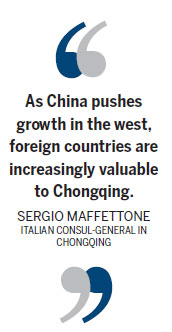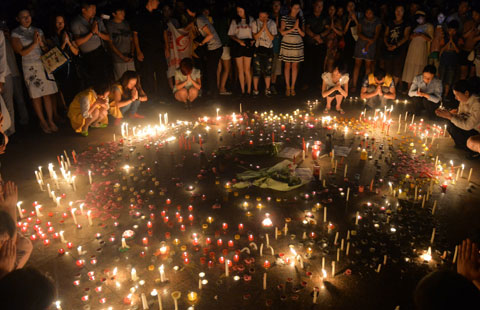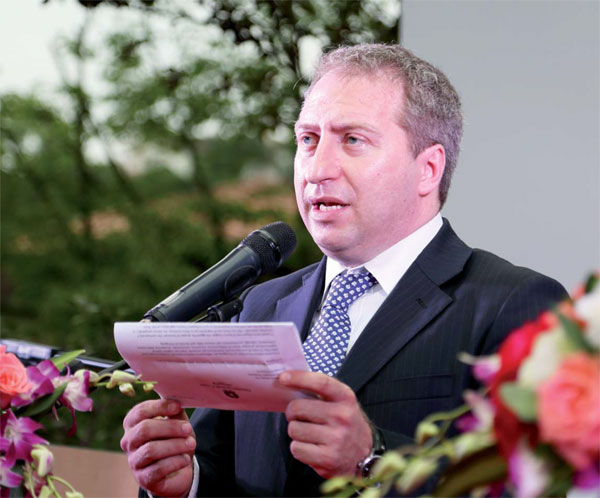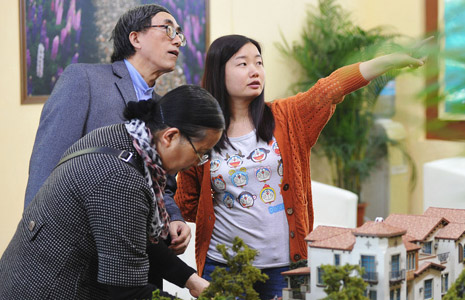Consul's two-way message on ties
Updated: 2014-08-15 05:45
By Hu Haiyan, Tan Yingzi and Ji Jin(China Daily Europe)
|
|||||||||||
Official predicts robust growth for Chongqing, a city unknown to many outside China
Sergio Maffettone is a man who wears two hats. Officially, as Italian consul-general in Chongqing, his ultimate master is the Italian foreign ministry in Rome. But, very unofficially, he sees himself as a spokesman and advocate for the city in western China.
Maffettone, 40, who speaks fluent Chinese, says that whenever he returns to Italy he pulls out all the stops to sell Chongqing to Italian companies and government officials.
|
Sergio Maffettone says Chongqing is not as well-known in the West as Beijing and Shanghai, but it is an exciting city with huge potential. Provided to China Daily |
"As a western city in China, Chongqing is not as well-known in the West as Beijing and Shanghai, but it is an exciting city with huge potential."
Chongqing has much to offer Italy economically that can be used to build a very strong relationship, he says.
"As one of the fastest-growing cities in western China, it has a strategic role nationally as the country pushes to develop its central and western regions. And as the only municipality in the interior of China, Chongqing is the gateway from the interior to the world."
Italy opened its consulate in Chongqing at the end of last year, and it has been helping Italian companies invest in Chongqing and the rest of the region. It also aims to increase bilateral trade between Chongqing and Europe, Maffettone says.
Italian companies that have heeded Chongqing's siren call include the vehicle maker Iveco, the rail engineering company AnsaldoBreda and the aerospace company Finmeccanica, which have set up branches there. The carmaker Fiat is also present with a joint venture in the city.
"As China pushes growth in the west, foreign countries are increasingly valuable to Chongqing," says Maffettone, speaking in his office in the Jiefangbei district, a bustling commercial area of the city.
"We have put a lot of effort into promoting commerce and trade collaboration between Chongqing and Europe. And we expect more cooperation between Chongqing and Italy, and Europe as a whole."
Chongqing's economic attractions include cheap labor and strong research and development, he says.

"Chongqing has favorable characteristics, such as the bonded port, which can help Italian companies including many small and medium-sized enterprises to do business here."
The Chongqing-Xinjiang-Europe rail link is another asset for a city, because it makes Chongqing the logistics hub for western China and links it more closely with Europe.
"Compared with air and sea transport, the railway link is the most economical choice in both time and cost," Maffettone says.
"It greatly changes logistics, reducing delivery times and thus setting itself up as a key position on a potential new, modern Silk Road, with, we hope, goods traveling both ways, from China to Italy and from Italy to China.
"The Chongqing-Xinjiang-Europe Rail is an attractive way for Italian companies to set up trade and commercial links with their Chinese counterparts."
However, more effort is needed to make the railway more efficient, he says.
"Many carriages come back from Europe empty. The government needs to help promote the link.
"It presents some great opportunities, but changes are needed so that it makes economic sense for companies to use it. The more they do, the lower the costs will be. Government can give some subsidies at first to attract more companies to come to use it."
Chongqing's industrial structure is attractive to foreign investment, he says.
"Chongqing has a very strong foundation in manufacturing industries including motor vehicles. One out of four laptop computers in the world is made in Chongqing. The automotive and chemical engineering industries, which are main industries, are also gaining increasing international cooperation."
As a proportion of overall China-Italy trade, Chongqing's part is small.
"The operation of the Italian consulate-general in Chongqing has multiplied trade opportunities, and they will grow," Maffettone says.
In 2012, exports from Chongqing to Italy were worth $415 million (309 million euros), and those from Italy to Chongqing $146 million. Last year, Chongqing's imports from Italy were worth $367 million, and exports $389 million.
"The figures are not that big, but we are confident more and more Italian companies will consider coming here," Maffettone says.
There are five areas where Italy and China could work more closely together, he says: agriculture, environmental protection, medical care, poultry and urbanization.
"More companies are coming to invest here as Chongqing becomes better known worldwide, and many companies in Chongqing are planning to go to Italy too."
The consulate and Chongqing authorities are now working on establishing direct flights between Chongqing to Italy, he says.
"The Chongqing aviation department has begun to negotiate with Italy to settle issues in aviation generally."
Maffettone is an aficionado of Chinese culture and studied Chinese at Peking University for four months in 2011.
In his spare time, he likes meeting locals and organizing activities that get locals acquainted with Italian culture. He uses WeChat to promote consular activities.
The consulate also organizes language exchange programs, such as getting Italian teachers to teach in Chongqing.
"Chongqing is a city representing the future of China. Many people compare it to Manhattan, but for me it is a city with very particular characteristics.
"Its topography, including mountains and hills, are amazing, calling for a lot of energy. It is a new frontier of China's growth, with high profit margins. Now is the time for those who are not already here to come and develop business."
Contact the writer at huhaiyan@chinadaily.com.cn
(China Daily European Weekly 08/15/2014 page19)
Today's Top News
British Chinese call for memorial to WWI workers
Pollution control set as priority for APEC meeting
Swimmer nabs silver at Gay Games in the US
China exports to Russia to surge
Chinese economic crime suspects repatriated
Ukraine deaths double in 2 weeks
Sensitive times in the making
Chinese film fans mourn for star
Hot Topics
Lunar probe , China growth forecasts, Emission rules get tougher, China seen through 'colored lens', International board,
Editor's Picks

|

|

|

|

|

|






